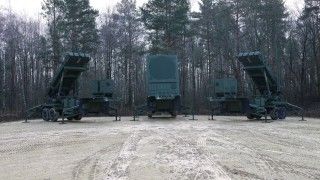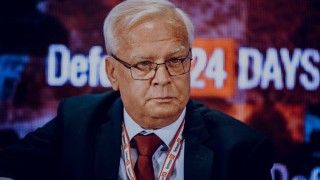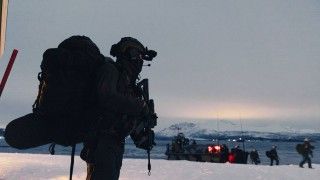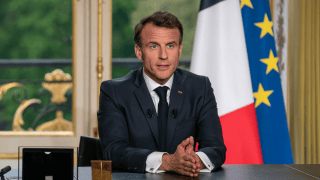East Front News #39: Russian Espionage in Poland; New Air Defence Contract; Changes in Management of Polish Defence Industry
East Front News is a weekly newsletter summarizing the past week’s most important events concerning security and the situation in the Central and Eastern Europe region. It includes original opinions and comments, along with key news items significant from a Polish perspective. If you would like to receive this newsletter, please sign up by clicking .

Contract for the Support of Polish IBCS-Patriot System
„Poland is an exceptional example of good cooperation for the defense and security of Poland, Europe, and the United States. As a country, Poland spends the most on defence relative to its capabilities in NATO; that is a signal showing the world that the issue of security and cooperation with the USA and Europe is not an abstraction. It is our security. We have been demonstrating for years that we are a loyal and stable ally, and regardless of political turbulence, Poland will be a country that respects all agreements. Investment in Poland’s security means not only the security of Poland but also that of our allies. And this solidarity should also serve as a signal to others.” – said Prime Minister Donald Tusk during the ceremony in Sochaczew.
The contract with the USA concerns the delivery of logistical support for the Patriot system in the Armed Forces and will include elements of technical support and training. The execution of the contract will enable the operational readiness of the PATRIOT launchers, which are the backbone of the Wisła programme. Poland is the second country in the world, after the USA, to possess the most modern PATRIOT systems equipped with the IBCS net-centric battle-command suite.
Another case of Russian espionage in Poland
On April 2nd, the Internal Security Agency reported the arrest of a 47-year-old Ukrainian citizen in the Mazowieckie province, who acted on the inspiration and orders of Russian intelligence. The detainee was reconnaissance of military facilities in Poland. He has already been charged with participating in the activities of Russian intelligence against the Republic of Poland, to which he has admitted and provided an explanation containing his ideological motives for cooperating with the Russian Federation.
The District Court in Warsaw imposed a 3-month arrest on the suspect, but he ultimately faces a sentence of 5 to 30 years in prison. The spokesman for the Ministry of the Interior and Administration, Jacek Dobrzyński, emphasized that since the full-scale Russian aggression against Ukraine in February 2022, ABW officers have already detained 44 people suspected of espionage or sabotage for Russia or Belarus in Poland.
Verdict for Le Pen
Marine Le Pen, the leader of France’s National Rally (Rassemblement National; RN), has been found guilty of embezzling public funds. According to prosecutors, between 2004 and 2014, RN used funds intended for financing parliamentary assistants to pay individuals working for the party in France. Estimates suggest that EU institutions suffered losses of approximately €4 million.
As a result of these charges, Le Pen has been sentenced to four years in prison (two of which are suspended, and she may serve them under electronic supervision), a fine of €100,000, and the loss of her passive voting rights for five years. The latter is the most significant consequence, as it effectively disqualifies the right-wing candidate from participating in the 2027 presidential elections—Le Pen had previously stated that this would be her last election.
The ruling,de facto, ends Marine Le Pen’s political career, despite her leading the polls with over 30% support. Although she has the right to appeal, the French administration is unlikely to process her case before the elections. The decision has sparked controversy and divided public opinion, as many view it as politically motivated, aimed at undermining the credibility and capabilities of the French right. Even politicians outside Le Pen’s circle, such as Prime Minister François Bayrou and far-left leader Jean-Luc Mélenchon, have questioned the fairness of the court’s ruling.
The controversy is further fuelled by the fact that, in similar cases, politicians have retained their passive voting rights. The verdict against Marine Le Pen worsens France’s already unstable political situation. President Emmanuel Macron’s bloc is suffering from catastrophically low approval ratings, and Paris is sinking deeper into a political crisis, which is also weakening France’s influence on the international stage.
Leadership Change at the Polish Armaments Group (PGZ)
On April 2nd, Polish Armaments Group (PGZ) confirmed the resignation of its President, Krzysztof Trofiniak, who had held the position since the end of March 2024. His departure marks a significant leadership change within Poland’s key defence industry holding. The current management board of PGZ now operates with four members: Arkadiusz Bąk, Marcin Idzik, Piotr Zawieja, and Jan Grabowski.
Speculation regarding Trofiniak’s potential dismissal had circulated for several weeks. The resignation is understood to be linked to concerns over the slow progress in building the group’s defence capabilities, especially at a time of heightened demand for increased ammunition production.
Krzysztof Trofiniak has longstanding ties to the Polish defence sector. From 1989 to 2015, he worked at Huta Stalowa Wola (HSW), including serving as its CEO from 2008 to 2015. He was previously Vice President of PGZ between 2014 and 2015 and played a leadership role in the Association of Employers of the Defence and Aerospace Industry. From 2017 until his recent appointment at PGZ, he was the CEO of Fabryka Maszyn Lubaczów Sp. z o.o.
His departure raises questions about the future direction and pace of modernization within Poland’s state-owned defence industry.
See also

NATO Commander Warns of Growing Russian Threat and Strategic Uncertainty
General Christopher Cavoli, Supreme Allied Commander Europe (SACEUR) and Commander of U.S. European Command, issued a stark warning about Russia’s long-term posture, calling it a „chronic and growing threat” to Europe and beyond. Speaking ahead of his expected departure from his dual command role this summer, Cavoli described Russia as a state „ready to use military force to achieve its geopolitical goals,” while actively conducting a destabilization campaign across Europe and other regions.
In his remarks, Cavoli emphasized that while the long-term vision is for national European forces to form the foundation of NATO’s eastern flank defence, this scenario remains unlikely for now—particularly due to the limited capacities of smaller states such as those in the Baltic region. He highlighted the unique capabilities of U.S. forces in Europe, noting that „U.S. troops provide capabilities that no one else has and can move the fastest.” According to Cavoli, these forces need to be stationed in locations where they can be quickly trained and deployed, backed by existing infrastructure and legal frameworks enabling rapid mobilization.
The discussion took place in the context of increasing concerns in Washington, where some Republican leaders—such as Senator Roger Wicker—have called for relocating more U.S. forces further east. This comes amid debates surrounding the Trump administration’s signals about reducing U.S. military engagement in European defence.
Cavoli also addressed the situation in Ukraine, cautioning that while it is unlikely Kyiv will fully reclaim occupied territories in the short term, „Ukraine is by no means doomed to fail.” He praised the continued resilience and effectiveness of Ukrainian forces, noting they are still capable of inflicting significant losses on Russian troops. However, he acknowledged that many analysts underestimated Russia’s capacity to regenerate forces and transition its economy to a wartime footing. When questioned about the possible Trump-era proposal to separate the roles of the U.S. European Command leader and NATO’s SACEUR, Cavoli noted such a shift would pose „challenges”—particularly in matters related to nuclear weapons command and control during a potential conflict.
Polish Recovery Vehicles in Ukraine
The Ukrainian 156th Independent Mechanized Brigade has released a video showcasing several vehicles in use by its forces. Alongside BWP-1TS infantry fighting vehicles and the BRDM-2 reconnaissance vehicle, the video featured a WZT-3 ARV supplied by Poland.
In November 2024, the Ukrainian Ministry of Defense confirmed the incorporation of the Polish-made WZT-3/3M armoured recovery vehicle into the Armed Forces. This confirmation substantiated rumors regarding the donation of such equipment from Warsaw to Kyiv, likely along with PT-91 Twardy tanks (with 30–60 units transferred) and T-72M/M1/M1R tanks (about 280 units transferred). In recent years, the Polish Army had around 30 examples of the WZT-3 and 3M models, meaning there was no shortage of surplus.
If you would like to receive this newsletter, please sign up by clicking.
East Front News is a weekly newsletter and article on Defence24.com summarizing the past week’s most important events concerning security and the situation in the Central and Eastern Europe region. It includes original opinions and comments, along with key news items significant from a Polish perspective.
Aleksander Olech, PhD & Jakub Palowski, Deputy Ed. in Chief, Michał Górski


















